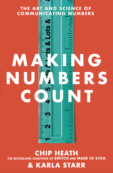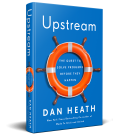Dan Ariely, author of the books Predictably Irrational and The Upside of Irrationality, recently released his third book, The Honest Truth About Dishonesty: How We Lie to Everyone—Especially Ourselves. Despite its sobering central finding—that essentially everyone cheats a little when given the opportunity to do so—it’s a playful and fascinating read.
To celebrate the launch of the book, we asked Dan three questions about it:
1. Dan, in your book you describe some experiments where college students consistently cheat to make a bit more money for themselves. But if you give them a “moral reminder” — i.e., asking them to sign their name to their university’s honor code as part of the task — then suddenly they don’t cheat anymore. I don’t know whether to be encouraged or depressed by this. I mean, is our morality dependent on our being reminded of it?
Encouraged or depressed? I think that this book should lead us to both. The main point of the book is that dishonesty is not limited to a few bad individuals, and that instead a lot of us can be dishonest and at the same time think well of ourselves. This is the bad news. The first part of the good news is that we only feel OK when we cheat a little bit, and because of that we don’t cheat much. In fact we cheat much much less than the standard economic theory would lead us to suspect. The second part of the good news is that we can influence the amount of dishonesty with very simple tools. For example, when we get people to recite the ten commandment, sign an honor code and other such interventions people cheat to a much less degree (often not at all). This is the good news. We all want to think of ourselves as honest, we basically want to be good, and as long as there are sufficient reminders around us we are going to behave better.
And what about morality? Should we think of people as having no backbone? Inline with much of the research in social psychology over the past 50 years, it is important to realize that the behavioral unit is not a person, but a person within a particular environment. The same person can behave very differently in different environments — which is why it is so important to figure out the exact environment and its effects on us. This is also why I think that it is important to understand dishonesty and redesign our environment in ways that would not tempt good people to behave badly.
2. On that last point, if people are looking to set up an environment that discourages dishonesty (e.g., preventing shrinkage in a retail environment or something like that), what kinds of factors should they be thinking about?
Here are the main lessons from the book about what kinds of actions can decrease dishonesty — and interestingly they are basically lessons that come from looking at religion.
1) Make the rules more black and white. Gray zones are basically very good to allow flexibility but they tempt us to read them in ways that are good or our short-term best interests — not in our long-term interest and not in the best interest of our company or clients. Think about rules for expense reports, business decisions, accounting etc. This is also true for personal rules about dieting, shopping etc
2) Clear moral standards and professional codes of ethics can be very useful in making the rules simpler and helping people behave better. And the more specific the rules are the more effective they can be.
3) Reminding people about their own moral obligations does a lot to decrease dishonesty. And this works even when we get self-declared atheists to swear on the bible.
4) If someone has misbehaved, a procedure like the Catholic confession where they get to say what they have done wrong and then express how sorry they are helps to open a new page, and reset the level of dishonesty to a much reduced level.
5) When the distance between our action and the final consequence is larger people are more likely to misbehave. When we deal with people who are far away, that we don’t know personally when we deal with transactions that are further from money — dishonesty increases. The lesson here is to try and make this distance lower, and get people to more clearly see the outcomes of their actions.
6) Conflicts of interests are much more influential than we think. We don’t appreciate how much they change the perspective of other people and for sure we don’t see how they work on us. As our appreciation for the power of conflicts of interests increases the more we are likely to stand guard and be more cautions when they arise.
3. So are you going to try out any of these principles on your students next semester? (Not to imply that MBA students would ever cheat, or even think of cheating…)
What I am going to try next is this:
1) I am going to sign an agreement with the students about the code of conduct in the class. This will include no email and web during class, doing their homework, and no collaborative work on papers and exams.
2) I will remind the students about the agreement at the beginning of each class by having the first slide show them the agreement.
3) Before the final exam I am going to ask them to write out their version of the honor code and hope that this will remind them to the largest extent who they really want to be.



